The Globe Theatre: London's Woodon "O"
by Elise Warner
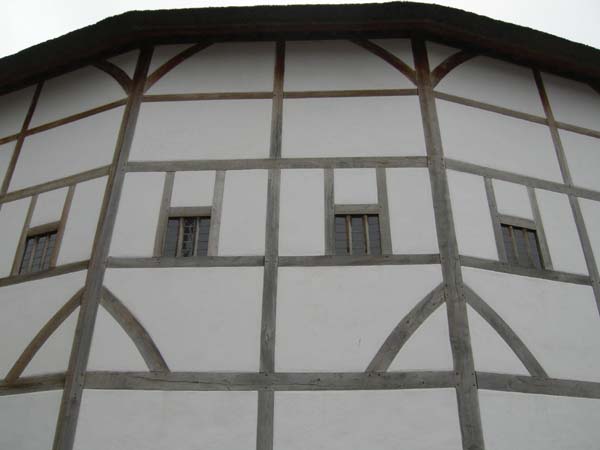
A crowd of twentieth century "groundlings" stands in
the open yard of the new Globe Theatre in Bankside, London.
Admission is £5.00; in the early 1600's, at the first Globe
Theatre, Shakespeare's "Wooden O," groundlings (commoners) paid
one English penny. Two pennies entitled a patron to a seat on a
bench in the gallery protected from sun and rain by a thatched
roof made of water reed. Three pennies bought a cushioned seat
close to the stage where one could see and be seen. The most
prestigious seats of all, the Lord's rooms -- at six pennies --
were behind and above the stage.
The groundlings, also known as "stinkards" (as they rarely
washed themselves or their clothes) stood in a yard covered with
a mixture of hazelnut shells, cinders, ash, sand and silt. Here
they ate and drank, fought, cheered, hissed and sometimes
critiqued an offending actor by throwing an orange. The orange
was a useful fruit; its scent protected the nose from stench and
it could be eaten when a groundling felt a pang of hunger.
Today, most of us shower, deodorize, sip from bottles of spring
water and enjoy an ice cream, but cheers for the British and
hisses for the French are still heard if you catch a performance
of Shakespeare's Henry the Fifth.
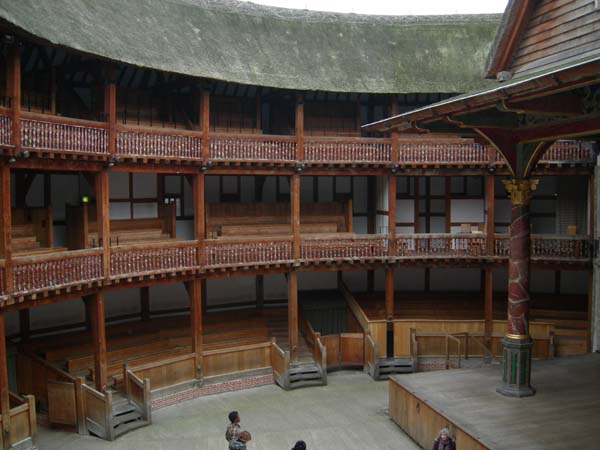
Born April 23, 1564, on Henley Street in Stratford-upon-Avon,
a two-day ride from the deathly plague that was sweeping through
London, William Shakespeare was the oldest son and first
surviving child of Mary Arden and John Shakespeare. Two sisters
had been born before him; one died at birth, the other at four
months of age. The town's bell would ring by July, mourning the
children struck down by the deadly epidemic, but Shakespeare
survived.
His father worked as a yeoman farmer, a craftsman, a glover, a
merchant, a constable and one of the borough's two chamberlains
in charge of property and finances. His mother was the youngest
and most favored of eight daughters of a farmer, who named her
executor of his will and left her his most valuable property.
Most scholars believe that both parents could read and do sums.
Educated at the local grammar school, young Will Shakespeare
would be transported by the traveling players who performed
"pastymes," or plays in Stratford-on-Avon. The townspeople were
entertained by dramas and spectacles presented in markets, the
Bridge Street innyards and the Gild Hall. The first plays
Elizabethan audiences attended were performed in inns and
courtyards. There was no gas lighting, limelight, electricity,
incandescent lamps or computer controlled light-boards.
Performances took place outdoors during daylight hours, allowing
eye contact between the actor and the observer. The players
presented medieval and religious plays as well as new works.
Stratford also had amateur mummers and a Lord of Misrule, the
master of revels, from Christmas to 12th Night. During John
Shakespeare's tenure as bailiff, two companies, The Queen's men
and the Earl of Worcester's men, played Stratford's Guild
Hall.
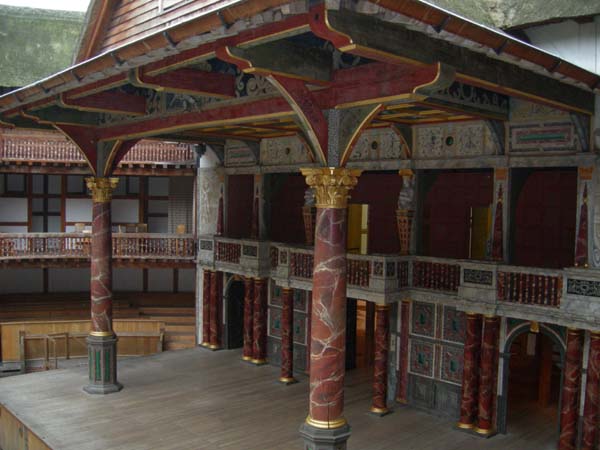
Accounts of Shakespeare's life between 1583 and 1588, the year
he arrived in London, are rather hazy. As John Shakespeare's
oldest son, William should have been apprenticed to his father's
business, but John's fortunes were in decline during this period
and Will, according to some, was apprenticed to a butcher. Then
there is the oft-repeated scuttlebutt that claims Shakespeare
left Stratford under a cloud after he was caught poaching in the
deer park of Sir Thomas Lucy, a local Justice of the Peace. Lucy
is portrayed as Justice Shallow in The Merry Wives of
Windsor. Other chronicles have Shakespeare spending some
time as a schoolmaster. The strongest possibility is a that
traveling theatre company passed through Stratford and invited
Shakespeare to join the troupe. As a dramatist or "scriviner"
and minor actor, he would be of great use to the players.
Shakespeare's
London was a city of contrasts. London Bridge, the Tower of
London, tall buildings, royal palaces and rows of shops competed
with streets littered with the rotting corpses of animals and
body wastes tossed indiscriminately into alleys. The sights, the
sounds, the energy of the city must have nourished his talents;
he began working as an actor and playwright with several
companies including The Queens Men, Pembroke's Men and Lord
Strange's Men. The troupes often disbanded and regrouped.
Shakespeare joined James Burbage and his sons, Richard and
Cuthbert, offering his talents as a dramatist and actor.
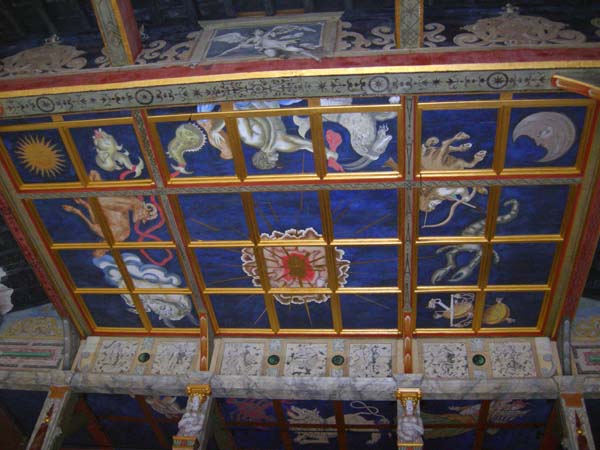
To avoid the restrictions imposed by authorities, theatres
were built outside the walls of London. In 1576, James Burbage,
an actor/manager, built a playhouse at Shoreditch, a leased site
in Finesbury Fields. He called it The Theatre. Over the next 60
years, 17 other playhouses were built around the city. At
Southwark, across the River Thames and easily reached by boat or
bridge, the theatres were close to bull- and bear-baiting rings,
prisons, cockpits and brothels. When flags were raised and
trumpets blasted the air announcing a performance, workers were
lured away from jobs -- which was just of the many reasons
London's Lord Mayors disapproved of plays. Plays encouraged
lust, sacrilege and sloth.
The Lord Mayors tried and failed to get the plays banned, but
the companies were protected by the Royal's Privy Council and
appeared by Royal Command. Shakespeare was a charter member of a
new theatre company under the patronage of Lord Hunsdon,
Chamberlain to Queen Elizabeth and an officer of the Privy
Council, in charge of Her Majesty's entertainment. Known as the
Lord Chamberlain's Men, they performed at The Theatre. Needing
money, the Burbages, who owned half the lease, offered shares in
The Theatre to five leading actors. Shakespeare accepted and
received a share of one eighth.
Perhaps his success led to a critique published in 1592 by
actor and dramatist Robert Greene, in Greene's "Groatsworth of
Wit," one of the earliest known references to Shakespeare.
Greene, one of a group of dramatists known as wits, who had
earned degrees at Oxford and Cambridge, attacked the Bard as "An
Upstart Crow." Greene was soon proved wrong; half of
Shakespeare's plays were published during the playwright's own
lifetime and by the time Shakespeare entered his early thirties,
he was established as a man of property.
In 1593 plague once again closed London's theatres, and over
10,000 deaths were reported. By 1594, the Lord Mayor succeeded in
reaching an agreement with the Lord Chamberlain. All companies,
except for the Lord Chamberlain's (who performed at The
Theatre), and The Lord Admiral's (who performed at the Rose),
were banned. Christopher Marlowe's plays were performed at the
Rose, Shakespeare's at The Theatre.
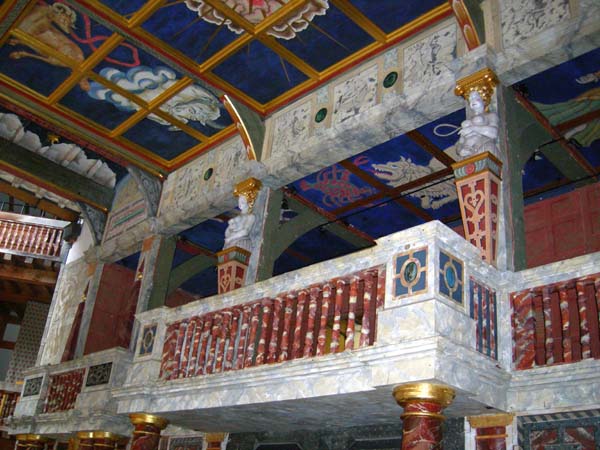
In 1597, the Burbage's landlord, Giles Allen, a Puritan who
disapproved of theatre, refused to renew the lease at the
Finesbury site. The company tried to build a theatre in a hall
at the Blackfriar's near St. Paul's Cathedral, but were stopped
by a petition circulated by residents of that upscale district.
The petition sited... "A general inconvenience to all the
inhabitants... All manner of vagrant and lewde persons that... will
come thither and worke all manner of mischeefs." His plan for an
indoor theatre thwarted, James Burbage died three months later,
leaving his two sons to carry on. The company rented a
playhouse, the Curtain, for two years, but 1597 and 1598 brought
a reversal in their fortunes and the company was forced to sell
the playbooks of Richard III, Richard II, Henry IV and
Love's Labor Lost.
In 1598, the Burbages took a 31-year lease on a plot of land
on Bankside. Then, late at night, during a heavy snowfall, the
Burbages transported timber and whatever else could be salvaged
from The Theatre across London Bridge to Southwark, and the first
Globe theatre was built. Henry the Fifth and As You
Like It were performed that year, and on September 21 a Swiss
visitor, Thomas Platter, "in the house with the thatched roof
witnessed an excellent performance of the first Emperor Julius
Caesar."
In Shakespeare's day, plays were written for
particular companies, becoming their exclusive property. The
playwrights -- then known as poets -- received a flat fee and
possibly a portion of the second day's receipts unless, like
Shakespeare, the poet owned a share. Shakespeare probably agreed
to write two plays a year for the company. Richard Burbage, the
leading tragedian, gained from his working friendship with
Shakespeare, originating the title roles in Hamlet, Lear,
Othello and Macbeth and becoming the foremost actor of
his time. Their arrangement was unusual and highly successful;
the Globe became "the glory of the Banke."
The Globe had a central "discovery place." Double
doors, covered with finely embroidered hangings, a curtain or
both enabled the actor to reach the upper level for balcony
scenes. Above that was a room with machinery for special
effects; cannon were fired, angels or ghosts descended and a trap
door in the floor led to hell. Wooden stage posts, painted to
look like marble, supported a canopy that represented heaven,
filled with clouds, stars, moons and the sun. The canopy did
double duty, protecting the actors and their costumes from the
sun.
Elizabeth I enjoyed masques -- a dramatic entertainment based
on mythological or allegorical themes -- and plays at Christmas.
She appointed A Master of Revels, who acted as a
producer/director and guardian of morals, in addition to
providing extra costumes and a hall to be used for the
performance. When Elizabeth died in 1603, James VI of Scotland
became James I of England and succeeded her. James loved the
arts, particularly theatre and the Chamberlain's Men. He
demanded they come under his patronage and granted a royal
patent. Their name changed to the King's Men. Shakespeare's
company played the Globe in winter and summer until 1608, when
the company began to play winters indoors at the Blackfriar's
theatre. When plague caused the closing of theatres, James
provided the troupe with engagements, playing for royalty outside
London until the danger had passed.
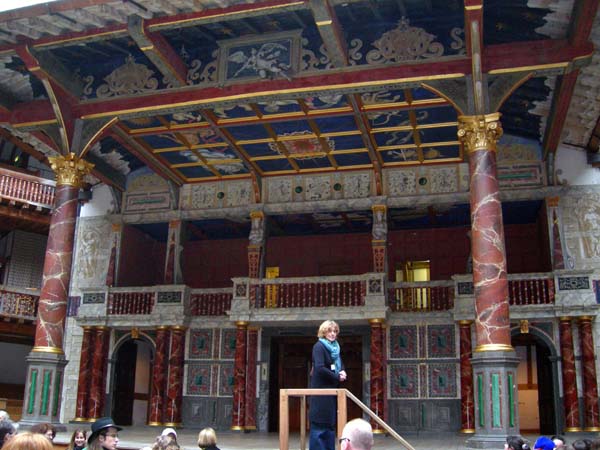
Today, as the doors open at the Globe, the audience is
transported back to the 16th century. Spectators, engrossed in
conversation, are barely aware of the faint throb of a drum;
music from the Elizabethan period underscores the play just as it
did in Shakespeare's day. The beat becomes deliberate as the
Musicians of the Globe appear, playing trumpet, cornet, sackbut
and percussion. The sound becomes intense as the Players fill
the stage. A stave pounds the floor. Excitement reaches a
crescendo as every onlooker melds with this "band of brothers"
appearing within the Globe, described by Shakespeare in Henry
the Fifth as the "Wooden O."
Fire destroyed the Globe during a performance of Henry
VIII. A piece of wadding fired from one of the stage cannons
landed on the thatched roof, smoldered, smoked -- ignored by a
group of spectators totally involved in the performance --and
finally burst into flame. The Globe burned to the ground in less
than an hour, but the audience of three thousand managed to
escape through the two exits. One patron's pants caught fire but
a quick-thinking friend extinguished the flames with a bottle of
ale. The second Globe, built on the foundations of the first,
was rebuilt immediately; this time it sported a tiled roof and
was thought to be "the fairest that ever was in England."
Shakespeare retired to Stratford-upon-Avon in 1613 and died in
1616; he bequeathed a ring to Richard Burbage as a token of
friendship. The Globe prospered until the Civil War of 1642,
when the Puritans closed all theatres. By 1644, the theatre had
been torn down, its foundations entombed by tenements.
Sam Wanamaker, a young American stage and motion picture actor
and director, searched for the site of the old Globe when he
arrived in London in 1949. All he found was a blackened bronze
plaque on the wall of a brewery. He founded the Shakespeare
Globe Trust and the rest of his life was dedicated to rebuilding
Shakespeare's Globe as a living memorial to the greatest
playwright of all time. His dream was realized: today's
enthusiastic audience enjoys the same excitement and pleasure
that Elizabethan patrons participated in so many centuries ago.
The Globe is the centerpiece of the Shakespearean Globe
Centre. It now has two more exits; fireboards are between the
walls and under the thatched roof. A close look at the thatch,
treated with a chemical fire retardant, will disclose nozzles of
a sprinkler system. Composed of water reed and lime, the
thatched roof of the Globe is the first to be seen in London
since 1666.
In addition to the theatre, the Centre also houses an autumn
education programme with staged readings, a lecture series and an
exhibition on the London where Shakespeare lived and worked.
William Shakespeare is the most widely read author in English
speaking countries; his work is revered all over the world. Ben
Jonson proved prophetic when he wrote of his friend, "Thou art a
monument, without a tomb, and art alive still, while thy book
doth live."
Related Articles:
- Visiting Shakespeare's Stratford-upon-Avon, by Pearl Harris
- https://www.timetravel-britain.com/articles/towns/stratford.shtml
More Information:
We regret that we no longer have the resources to maintain up-to-date links and/or hours and pricing details for the various sites and attractions listed on this website. For more information about the location(s) listed above, please use your favorite search engine or visit Wikipedia.
Elise Warner's articles have been published in The Travel Section of The Washington Post and in magazines such as Rock & Gem, Historic Traveler, Animal Watch, Kaleidoscope, 50 and Forward and Pennsylvania and on-line at literarytraveler.com and internationalliving.com.
Article © 2006 Elise Warner
Photos © 2008 Moira Allen
|
